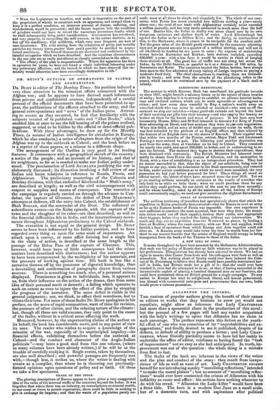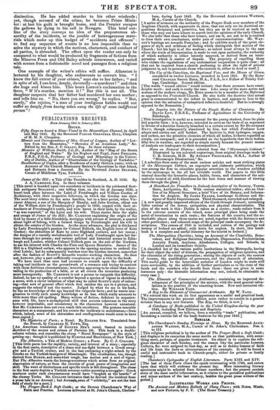ALLANSTON THE INFIDEL.
THE custom of popular authors giving the benefit of their names as editors to works that they hesitate to avow yet would not repudiate, might allow an inference that Lady CHATTERTON had more than a sponsorial share in the production of this novel: but the perusal of a few pages will lead any reader acquainted with the lady's writings to opine that Allanston has no claim to such parentage. The preface represents this fiction as the youth- ful effort of one who was conscious of its "improbabilities and ex- aggerations," and fondly desired to see it published, despite of its defects, in default of ability to produce a better ; and Lady CHAT- TERTON, whose friendly partiality seems to have led her rashly to undertake the office of editor, confesses to having found the "task of improvement" not so easy as she had anticipated. In truth, im- provement was out of the question : the whole thing is a mistake from first to last.
The faults of the book are inherent in the views of the writer and the plan and conduct of the story : they result from inexpe- rience of life as well as want of art. Lady CHATTERTON excuses herself for not introducing sundry "moralizing reflections," intended " to make the moral plainer"; but no amount of " moralizing reflec- tions" would ever have connected the crimes of Allanston with his infidelity as cause and effect : his actions have nothing whatever to do with his creed. " Allanston the Lady-killer " would have been a fitter title. The hero is a modern Don Juan on a small scale, but of a domestic turn, and with aspirations after political
distinction. He has added murder to his other misdeeds ; yet, though accused of the crime, he becomes Prime Minis- ter : at last his guilt is brought home, and the Premier escapes the gallows by dying in his cell in Newgate. This brief out- line of the story conveys no idea of the preposterous ab- surdity of the incidents, or the jumble of heterogeneous mate- rials which make up this budget of " accidents and offences" : to find any sequence of events is no less impossible than to solve the mystery in which the motives, characters, and conduct of all parties, is shrouded. The effect upon the reader can only be compared to what would be produced by fragments of fictions from the Minerva Press and Old Bailey schools interwoven, and varied with scenes from a fashionable novel and passages from a religious tale.
One example of the writer's ethics will suffice. Allanston is lectured by his daughter, who endeavours to convert him. " I know the full extent of your crimes," says she to her father; " and in spite of all, I can love, deeply, devotedly—a murderer ! " and then she hugs and kisses him. This beats LISTON'S exclamation in the farce, " If it's murder, mention it ! " But this is not all. The daughter suspects that her father had murdered her own mother ; and tells him so. " No, there you are wrong," he replies. " But, surely," she rejoins, " a man of your irreligious habits would not suffer so deeply from having taken away the life of some indifferent person" !



























 Previous page
Previous page